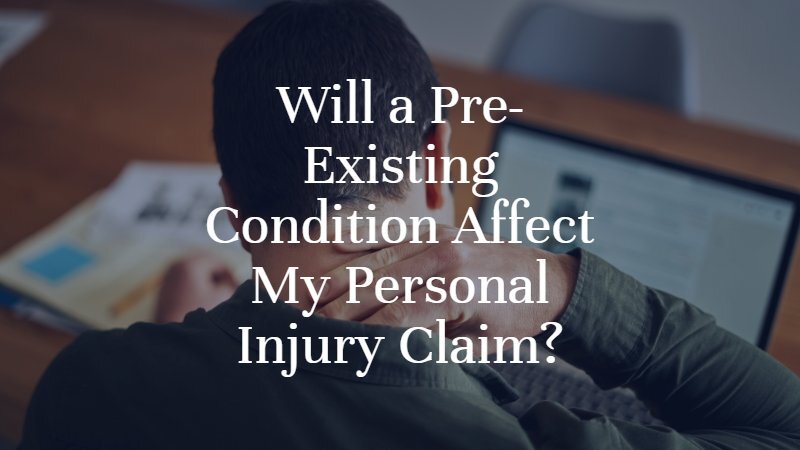Will a Pre-Existing Condition Affect My Personal Injury Claim?

Suffering an injury is always painful and distressing, especially when it’s severe enough to impact your ability to work and carry out routine daily tasks. In some cases, an injury has life-altering permanent effects, such as disability or impairment.
When another party’s reasonable care could have prevented the injury, the injury victim may file a compensation claim against the at-fault party to recover their damages, like medical expenses, lost earnings, future income loss, and pain and suffering.
But what happens if the injury victim has a pre-existing medical condition or has suffered an earlier injury? How do pre-existing conditions affect personal injury claims in Oklahoma?
Understanding the Impacts of Pre-Existing Conditions on Oklahoma Personal Injury Cases
In most cases, an injury victim recovers compensation through a direct claim against the at-fault party’s insurance; for instance, auto insurance after a car accident, or commercial liability insurance after a slip-and-fall accident in a store. Personal injury cases become lawsuits only when the insurance company denies or undervalues claims, including those involving pre-existing conditions.
Insurance companies are private businesses that exist to make profits. If an injury victim has a pre-existing condition, such as a back or neck condition, a skeletal-muscular disease, or a history of a previous head injury, the insurance company will likely dispute the claim and blame the symptoms on the pre-existing condition.
Do I Have to Accept a Claim Denial Based on a Pre-Existing Condition?
Insurance companies commonly deny claims based on pre-existing conditions, operating under the hopeful assumption that you’ll drop the claim and absorb the costs yourself. Fortunately, representation by an experienced Oklahoma City personal injury lawyer helps injury victims recover full and fair compensation, even if they have pre-existing conditions, under a legal doctrine known as the eggshell-skull rule.
This doctrine takes its name from the theory that a negligent party is responsible for head-injury damages if their actions caused an accident, even if the accident victim had a medical condition that caused their skull to be as fragile as an eggshell.
In this example, the person with the eggshell skull would still have their skull intact if the responsible party hadn’t been careless or reckless and caused the accident. Although the example is colorful, this doctrine applies to injury victims with common pre-existing conditions such as degenerative disk disease, osteoporosis, autoimmune diseases, or prior injuries.
Insurance Company Bad Faith Practice In Pre-Existing Condition Cases
Unfortunately, it is far from unusual for insurance companies to deny claims based on pre-existing conditions. They also use other tactics, such as asking for medical authority to access a victim’s injury record and then using it to comb through the injury victim’s entire medical history to find a previous injury to blame for their symptoms.
Recovering compensation despite having a pre-existing condition requires proving that the accident worsened the condition or exacerbated the symptoms, or that the injury symptoms are completely unrelated to the pre-existing condition, such as affecting a different part of the body.
In some cases, representation by a skilled personal injury attorney not only recovers full compensation for an injury victim’s damages despite their pre-existing condition but may also gain additional compensation for an insurance company’s bad-faith practices. When an insurer fails to live up to the terms of its contract, it can be held liable for compensating the injury victim through a lawsuit for bad-faith insurance practices.
Contact an Oklahoma City Personal Injury Lawyer at Dan Davis Law
If you’ve been injured and face challenges due to a pre-existing condition, don’t navigate the insurance claim process alone. Contact an experienced Oklahoma City personal injury attorney from Dan Davis Law at (405) 930-4210 to review your case and help you pursue the full compensation you deserve.